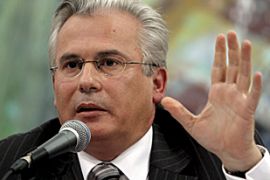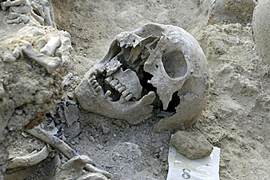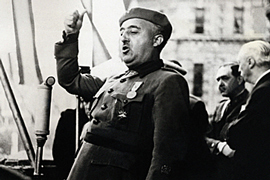Spain’s top judge appears in court
Baltasar Garzon accused of overstepping authority in probing civil war atrocities.

‘Injustice’
Among those standing outside the court was Gervasio Puerta, 88, who fought against Franco in the war and ended up spending eight years in jail.
He said: “It is an injustice to try a person who wants to defend those of us who suffered under Franco.”
Garzon’s 2008 investigation was the first in official inquiry in Spain and was widely seen as seeking an indictment of the Franco government itself.
It looked into the disappearance or execution of tens of thousands of civilians during the country’s 1936-39 civil war and in the early years of the Franco government.
Garzon argued that Franco and his supporters engaged in a crime against humanity by waging a systematic campaign to eliminate opponents.
The judge ordered the unearthing of dozens of mass graves believed to hold remains of victims of pro-Franco groups.
Old wounds
Prosecutors objected, arguing that such crimes were covered by an amnesty passed in 1977 – two years after Franco died – as Spain moved to restore democracy and focus on rebuilding the ruined nation rather than on reopening old wounds.
 |
| Garzon ordered the unearthing of dozens of mass graves [EPA] |
Garzon ultimately bowed out and transferred the case to provincial-level courts.
Manos Limpias, a labour union representing civil servants and the plaintiff in the current case, argued to the supreme court that even before dropping the case, Garzon knowingly overstepped his bounds.
The organisation said Garzon had gone too far in ordering government agencies to provide him with information on missing people from the war and ordering graves to be dug up, even though cases of forced disappearance do not fall under the jurisdiction of his court.
Speaking outside the courthouse on Wednesday, Miguel Bernard, the group’s leader, said: “Garzon has no business getting involved in something where he has no jurisdiction.”
Universal jurisdiction
Garzon is the most prominent symbol of Spain’s doctrine of universal jurisdiction, which holds that crimes such as torture or terrorism can be tried in Spain even if they are alleged to have been committed elsewhere and have no link to the country.
 |
| Garzon’s inquiry was widely seen as seeking an indictment of the Franco government [AFP] |
The judge used the doctrine in 1998 to have Pinochet, the former Chilean president, arrested during a visit to London, although Britain ultimately refused to extradite him to Madrid for trial.
Garzon also indicted bin Laden in 2003 over the September 11, 2001, attacks in the US.
More recently, other judges at Garzon’s court have used the principle to pursue current or former officials in Israel over an air force bombing in Gaza in 2002 that targeted and killed a Hamas leader but also killed 14 civilians.
They have also used it in the US over the treatment of prisoners at Guantanamo Bay and against China over alleged abuses in Tibet.
Amid growing complaints from abroad, particularly from Israel and China, that Spain was acting like a global police force, parliament scaled back the doctrine in June.
Now, Spanish judges will be able to pursue universal justice cases only if the crimes involve Spanish victims or the alleged perpetrators are in Spain.
It is not known when the supreme court might decide whether to charge Garzon.